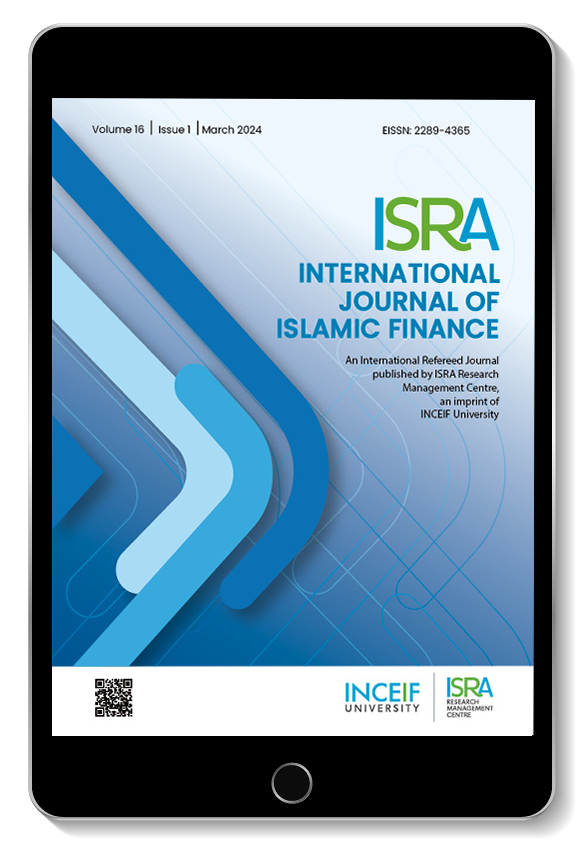Islamic finance and economic growth: the Turkish experiment
IF 2.8
Q2 BUSINESS, FINANCE
引用次数: 9
Abstract
PurposeThis study aims to empirically investigate the connection between Islamic finance and economic growth in Turkey using the endogenous growth model.Design/methodology/approachIt applies quantile regression with the Markov chain marginal bootstrap resampling technique by adopting total Islamic financing as the main exogenous explanatory factor in the endogenous growth model, while the gross domestic product (GDP) is employed as a measure of economic growth. The sample consists of all full-fledged participation (Islamic) banks operating in Turkey spanning from 2013Q4 until 2019Q4. The study uses academic literature, official financial reports from the Participation Banks Association of Turkey, REDmoney Group, Islamic Financial Services Board (IFSB) and the International Monetary Fund (IMF) database.FindingsThe results show that Islamic finance is promoting economic growth in Turkey, which mirrors the success of the New Turkish Economy Program (2019–2021) which aims at boosting economic growth by enhancing the Islamic finance share in the Turkish banking sector and the global market.Research limitations/implicationsTurkey has a dual banking system (conventional and participation (Islamic)) and both can influence the country's real economy. This study is limited to the influence of Islamic banking on Turkish economic growth. The study also restricts its size and coverage from 2013Q4 to 2019Q4, to cover the years over which data for all variables included in the research are available.Practical implicationsThis paper suggests the adoption of the Turkish successful experiment as a path to reach economic growth by increasing the Islamic finance share in the banking industry for countries that seek to promote economic growth by Islamic finance, as the findings of this paper support.Originality/valueThis study is the first that examines the influence of Islamic finance on economic growth under a new theoretical framework of the endogenous growth model in Turkey using a robust non-parametric approach.伊斯兰金融与经济增长:土耳其的实验
目的本研究旨在利用内生增长模型实证研究伊斯兰金融与土耳其经济增长之间的关系。设计/方法论/方法将分位数回归与马尔可夫链边际自举重采样技术相结合,将伊斯兰融资总额作为内生增长模型中的主要外生解释因素,同时将国内生产总值(GDP)作为衡量经济增长的指标。样本包括2013年第四季度至2019年第四四季度在土耳其运营的所有全面参与(伊斯兰)银行。该研究使用了学术文献、土耳其参与银行协会、REDmoney集团、伊斯兰金融服务委员会(IFSB)和国际货币基金组织(IMF)数据库的官方财务报告。结果显示,伊斯兰金融正在促进土耳其的经济增长,这反映了土耳其新经济计划(2019-2021)的成功,该计划旨在通过提高伊斯兰金融在土耳其银行业和全球市场中的份额来促进经济增长。研究局限性/影响土耳其有双重银行体系(传统和参与(伊斯兰)),两者都可以影响该国的实体经济。本研究仅限于伊斯兰银行业对土耳其经济增长的影响。该研究还限制了其规模和覆盖范围,从2013年第四季度到2019年第四季,以涵盖研究中所有变量的数据可用的年份。实际含义本文建议采用土耳其的成功实验,作为通过增加伊斯兰金融在银行业中的份额来实现经济增长的途径,以帮助那些寻求通过伊斯兰金融促进经济增长的国家,正如本文的研究结果所支持的那样。原创性/价值本研究首次使用稳健的非参数方法,在土耳其内生增长模型的新理论框架下,考察伊斯兰金融对经济增长的影响。
本文章由计算机程序翻译,如有差异,请以英文原文为准。
求助全文
约1分钟内获得全文
求助全文
来源期刊

ISRA International Journal of Islamic Finance
BUSINESS, FINANCE-
CiteScore
3.40
自引率
17.40%
发文量
18
审稿时长
20 weeks
期刊介绍:
It is the aspiration of the editorial committee that IJIF achieves the highest rank in quality and substance. It is thus our aim that the journal be carried in the Thompson Reuters’ ISI and Scopus databases. By ensuring high standards in articles published in Islamic finance we ensure that further innovation and research is carried out and promoted in the Islamic finance industry and academia. IJIF publishes 2 issues per annum.
 求助内容:
求助内容: 应助结果提醒方式:
应助结果提醒方式:


